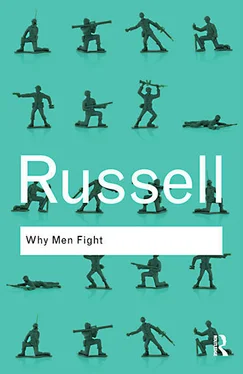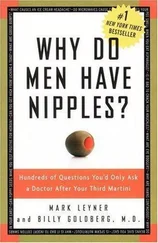There is a not uncommon belief that what is instinctive in us cannot be changed, but must be simply accepted and made the best of. This is by no means the case. No doubt we have a certain native disposition, different in different people, which co-operates with outside circumstances in producing a certain character. But even the instinctive part of our character is very malleable. It may be changed by beliefs, by material circumstances, by social circumstances, and by institutions. A Dutchman has probably much the same native disposition as a German, but his instincts in adult life are very different owing to the absence of militarism and of the pride of a Great Power. It is obvious that the instincts of celibates become profoundly different from those of other men and women. Almost any instinct is capable of many different forms according to the nature of the outlets which it finds. The same instinct which leads to artistic or intellectual creativeness may, under other circumstances, lead to love of war. The fact that an activity or belief is an outcome of instinct is therefore no reason for regarding it as unalterable.
This applies to people’s instinctive likes and dislikes as well as to their other instincts. It is natural to men, as to other animals, to like some of their species and dislike others; but the proportion of like and dislike depends on circumstances, often on quite trivial circumstances. Most of Carlyle’s misanthropy is attributable to dyspepsia; probably a suitable medical regimen would have given him a completely different outlook on the world. The defect of punishment, as a means of dealing with impulses which the community wishes to discourage, is that it does nothing to prevent the existence of the impulses, but merely endeavours to check their indulgence by an appeal to self-interest. This method, since it does not eradicate the impulses, probably only drives them to find other outlets even when it is successful in its immediate object; and if the impulses are strong, mere self-interest is not likely to curb them effectually, since it is not a very powerful motive except with unusually reasonable and rather passionless people. It is thought to be a stronger motive than it is, because our moods make us deceive ourselves as to our interest, and lead us to believe that it is consistent with the actions to which we are prompted by desire or impulse.
Thus the commonplace that human nature cannot be changed is untrue. We all know that our own characters and those of our acquaintance are greatly affected by circumstances; and what is true of individuals is true also of nations. The root causes of changes in average human nature are generally either purely material changes—for instance, of climate—or changes in the degree of man’s control over the material world. We may ignore the purely material changes, since these do not much concern the politician. But the changes due to man’s increased control over the material world, by inventions and science, are of profound present importance. Through the industrial revolution, they have radically altered the daily lives of men; and by creating huge economic organizations, they have altered the whole structure of society. The general beliefs of men, which are, in the main, a product of instinct and circumstance, have become very different from what they were in the eighteenth century. But our institutions are not yet suited either to the instincts developed by our new circumstances, or to our real beliefs. Institutions have a life of their own, and often outlast the circumstances which made them a fit garment for instinct. This applies, in varying degrees, to almost all the institutions which we have inherited from the past: the State, private property, the patriarchal family, the Churches, armies and navies. All of these have become in some degree oppressive, in some measure hostile to life.
In any serious attempt at political reconstruction, it is necessary to realize what are the vital needs of ordinary men and women. It is customary, in political thought, to assume that the only needs with which politics is concerned are economic needs. This view is quite inadequate to account for such an event as the present war, since any economic motives that may be assigned for it are to a great extent mythical, and its true causes must be sought for outside the economic sphere. Needs which are normally satisfied without conscious effort remain unrecognized, and this results in a working theory of human needs which is far too simple. Owing chiefly to industrialism, many needs which were formerly satisfied without effort now remain unsatisfied in most men and women. But the old unduly simple theory of human needs survives, making men overlook the source of the new lack of satisfaction, and invent quite false theories as to why they are dissatisfied. Socialism as a panacea seems to me to be mistaken in this way, since it is too ready to suppose that better economic conditions will of themselves make men happy. It is not only more material goods that men need, but more freedom, more self-direction, more outlet for creativeness, more opportunity for the joy of life, more voluntary co-operation, and less involuntary subservience to purposes not their own. All these things the institutions of the future must help to produce, if our increase of knowledge and power over Nature is to bear its full fruit in bringing about a good life.
Under the influence of socialism, most liberal thought in recent years has been in favour of increasing the power of the State, but more or less hostile to the power of private property. On the other hand, syndicalism has been hostile both to the State and to private property. I believe that syndicalism is more nearly right than socialism in this respect, that both private property and the State, which are the two most powerful institutions of the modern world, have become harmful to life through excess of power, and that both are hastening the loss of vitality from which the civilized world increasingly suffers. The two institutions are closely connected, but for the present I wish to consider only the State. I shall try to show how great, how unnecessary, how harmful, many of its powers are, and how enormously they might be diminished without loss of what is useful in its activity. But I shall admit that in certain directions its functions ought to be extended rather than curtailed.
Some of the functions of the State, such as the Post Office and elementary education, might be performed by private agencies, and are only undertaken by the State from motives of convenience. But other matters, such as the law, the police, the Army, and the Navy, belong more essentially to the State: so long as there is a State at all it is difficult to imagine these matters in private hands. The distinction between socialism and individualism turns on the non-essential functions of the State, which the socialist wishes to extend and the individualist to restrict. It is the essential functions, which are admitted by individualists and socialists alike, that I wish to criticize, since the others do not appear to me in themselves objectionable.
The essence of the State is that it is the repository of the collective force of its citizens. This force takes two forms, one internal and one external. The internal form is the law and the police; the external form is the power of waging war, as embodied in the Army and Navy. The State is constituted by the combination of all the inhabitants in a certain area using their united force in accordance with the commands of a Government. In a civilized State force is only employed against its own citizens in accordance with rules previously laid down, which constitute the criminal law. But the employment of force against foreigners is not regulated by any code of rules, and proceeds, with few exceptions, according to some real or fancied national interest.
Читать дальше












